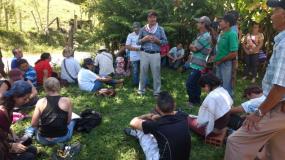The Caravan for life, territory, water and peace
This year, the caravan organized by La Redher, a space of articulation between Colombian organizations and internationalist groups, was held in Eastern Antioquia, in alliance with MOVETE, a social movement for the life and the defense of the territories based in this same region.
Allowing a space for exchanges between popular movements of various regions engage in the resistance, the protection of the territories, the visibility of the territorial conflicts caused by the interventions of the multinationals and their model of extractive exploitation, the caravans are occasions for the people to gather up and strengthen their struggles.
Eastern Antioquia: a territory in conflict
Eastern Antioquia is one of the nine regional sub-divisions of the Antioquia Department. This area of picturesque landscape includes various climates, mountains, overflowing with a vast biodiversity. This high plateau, located in the central mountain range, is home to important water sources such as the Páramo de Sonsón Reserve, as well as water sources and micro-basins that supply rural communities and flow into rivers.
The region has historically been the theater of resistance of the peasant populations. Since the 1970s, communities has found themselves right at the center of social and armed conflict, causing forced displacement as well as the murder of social leaders. Now, history is repeating itself, but from an another aspect: the territory has indeed become the playground for many extractive projects, whether mining or hydro-electricitc projects. Benefiting from the peace process in the country, multinationals seek a territorial reconfiguration of cities and regions, including changes in land use.
Eastern Antioquia produces more than 40% of the total energy produced in Colombia, proving at the same time a very important source of water and an energy generator for exportation. There are currently 54 micro-center building permits and the state has granted several mining concessions in the region, granting no voice or decision-making power to the communities.
Impacts and resistance
The caravan was able to highlight the repercussions of imposing this model of development. In this sense, the economic activities of communities are forced to change from an agricultural production sector to the sale of services and industrial production. This imposed model also has social repercussions such as the rupture of the community fabric formed by peasant farmers and social leaders now persecuted by paramilitary groups in the region.
Governments and regional authorities create laws, policies and territorial reconfigurations to implement projects at the service of multinationals interests. In addition to the environmental disasters that make the land unusable, the rural population is depaysanized, that is, the transformation of their identity as workers of the land, to become the workforce of the multinationals.
For these reasons, the peasants of Eastern Antioquia decided to organize, unite and mobilize themselves around the defense of the territory. Gathered in a large movement, a number of popular actions, ranging from tutelage to the creation of preliminary consultative assemblies, to the request for public hearings, have been put in place.
Water Festival: "To love, defend and live in the paramo"
During the 19th and 20th of October, the ninth Water Festival organized by the Social Movement for the Defense of Life, Water and Territory - Movote - took place in the heart of the paramo of Sonsón. This event aimed to bring together the different communities of Eastern Antioquia to build strength as central actors and actresses of resistance. The debate on the problem of hydroelectric power stations was at the center of the event: "they are destroying our ecosystem, where are we going to live, what are we going to eat, from what source of water are we going to live?" Alirio Quintero, a farmer from the village of Jerusalén in Sonsón.
"Concern arises because we see our area flooded and the economic benefits will only benefit a few; what the communities claim is to live in a dignified and permanent way in their own territories, "said Omar Andrés Osorio of Tulpa Comunitaria.
